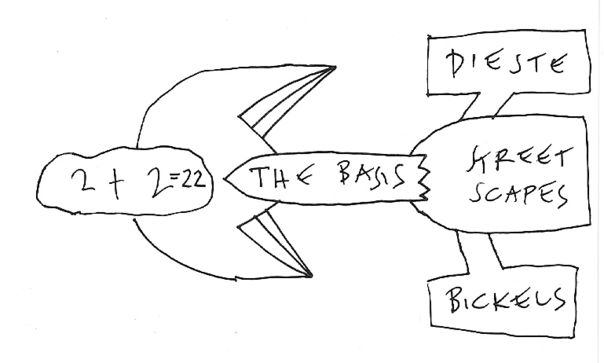Log #7
by PABLO Roldán

21 April. 2 pm.
We are getting ready for another conference at Talents. Judging by the rumours and by what has been read read, I have the feeling that now is our turn to meet the radical group of the festival, to discover those who are in the margins. The activity is a “case study”, which consists of the screening of a film that is being shown at the festival, where we have the opportunity to meet the director and someone else from the crew to discuss the process of making the film, finishing and distributing it.
It is the turn of Heinz Emigholz, German filmmaker who in the last Berlinale premiered four feature films at the same time (all of them in BAFICI). Emigholz is known for his work in the field of experimental films of architecture and space. His film Streetscapes [Dialogue] is a work of deep reflection on those notions that have made him make the films he makes, films that are, in principle, in the margin.
The lights turn off and the film starts to roll. Five minutes go by and the first walkaways can be heard: the style of the German filmmaker is not traditional at all and he sets out to meddle with what has been sold to us as cinema. “I’m not interested in fiction, I’m not interested in characters”, says the protagonist, a film director who is evidently a sort of alter ego of the same Emigholz, to whom appears to be his therapist.
The film is a pretty direct reflection on the filmmaking profession and the doubts that invade the director each time he faces the job of constructing a film, not of filming, which he considers is a liberating action. In this reflection, which was built based on the conversations that the very director had with his psychoanalyst, Emigholz allows himself to eradicate the fear of joking about a profession that is increasingly moving away from what he would prefer. .
The associations with buildings, faces and the mechanisms of film are the principles for the construction of this film which is, basically, a long conversation between two characters: an attentive analyst and a filmmaker on the edge of the vacuum of depression, who sees only darkness in the world and shadows in his profession and who also does not have any apparent rules of space. The “couch sessions” take place in different places, without any of the characters moving, making up a trip through the spaces that inspire the director, in this case spaces in Paraguay. .
The film is in this way an open letter that works as a manifest of the positions of Heinz Emigholz’s cinema, his main note being the relationship of the camera with what is filmed: “The camera is not the eye, as many say. The camera is a language in itself, is like another person in the conversation”, asserts the director, who re-examines his positions during the entire film. .
The film ends: the experience exudes a halo of a review of cinema from a place of darkness and the adjectives that appear to describe that experience are, perhaps, cryptic, rigorous, tedious. It is a puzzle with pieces that have been lost forever. .
The talk that follows, moderated by the other actor of the film Jonathan Perel (who is himself an Argentine film director) has the same tone than the film: with ideas that are far-off from the traditional ones but which are full of passionate reflections about the boundaries of cinema. The audience remains somewhat quiet and Perel encourages the conversation, allowing the director to talk about his work with architecture and about the feeling of permanent tension that architecture produces in him. Emigholz declares that, like buildings, his film is built with layers (some almost indecipherable) and is full of different meanings and purposes: “there should not be films with only one meaning or feeling, everything should be complicated, full of ideas, the same as in life”, he asserts. An implicit concern appears also during the conversation. The director asks the audience if they have seen or read the film because since there are dialogues throughout its entire duration the eye must prioritize. “I had never seen it with subtitles and I guess it’s a risk which I had to take” said Emigholz, hoping people had paid more attention to his meticulous framing, which he considers is full of tensions that he wished to convey. .
In the end, the director says goodbye inviting us to finish the conversation with his other films in the festival Bickels [Socialism], 2+2=22 [The Alphabet] and Dieste [Uruguay], which, according to him, are a continuation of his concerns as an artist and of the films that in Streetscapes [Dialogue] are commented.
With
Heinz Emigholz
Jonathan Perel
Tutor, Quintín
Talent Press Coordinator/Programmer, Mariángela Martínez Restrepo
Text Translator, Clara Picasso

